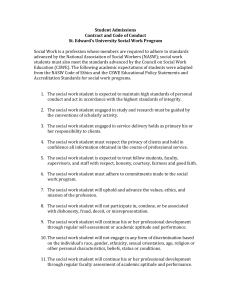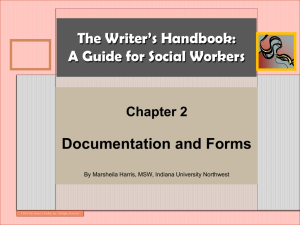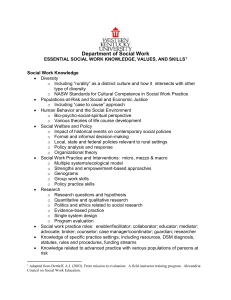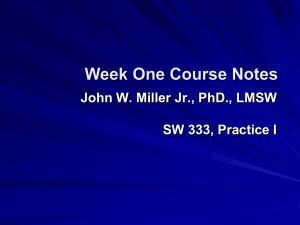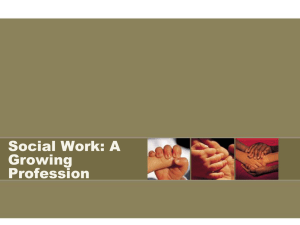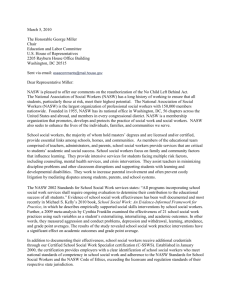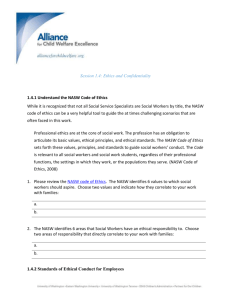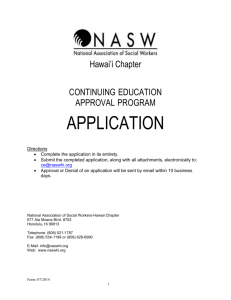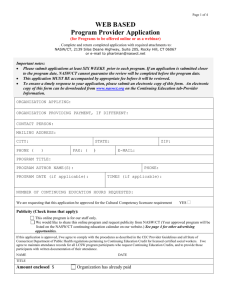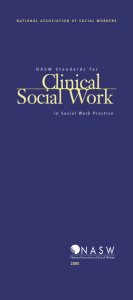Standards for School Social Work Practice
advertisement
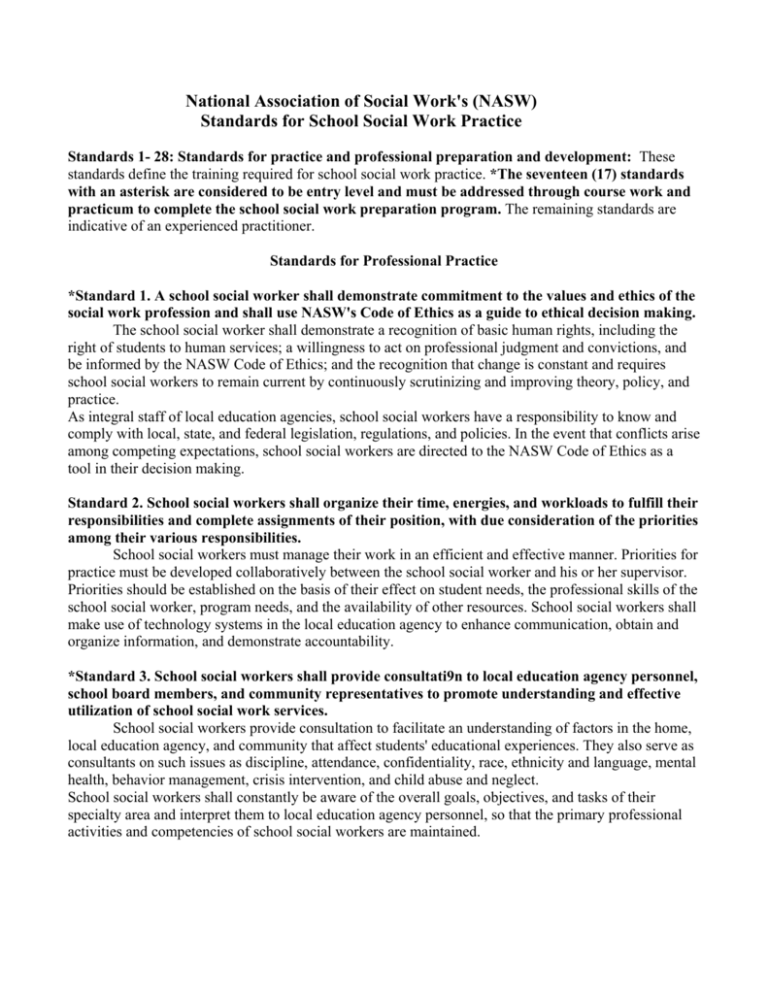
National Association of Social Work's (NASW) Standards for School Social Work Practice Standards 1- 28: Standards for practice and professional preparation and development: These standards define the training required for school social work practice. *The seventeen (17) standards with an asterisk are considered to be entry level and must be addressed through course work and practicum to complete the school social work preparation program. The remaining standards are indicative of an experienced practitioner. Standards for Professional Practice *Standard 1. A school social worker shall demonstrate commitment to the values and ethics of the social work profession and shall use NASW's Code of Ethics as a guide to ethical decision making. The school social worker shall demonstrate a recognition of basic human rights, including the right of students to human services; a willingness to act on professional judgment and convictions, and be informed by the NASW Code of Ethics; and the recognition that change is constant and requires school social workers to remain current by continuously scrutinizing and improving theory, policy, and practice. As integral staff of local education agencies, school social workers have a responsibility to know and comply with local, state, and federal legislation, regulations, and policies. In the event that conflicts arise among competing expectations, school social workers are directed to the NASW Code of Ethics as a tool in their decision making. Standard 2. School social workers shall organize their time, energies, and workloads to fulfill their responsibilities and complete assignments of their position, with due consideration of the priorities among their various responsibilities. School social workers must manage their work in an efficient and effective manner. Priorities for practice must be developed collaboratively between the school social worker and his or her supervisor. Priorities should be established on the basis of their effect on student needs, the professional skills of the school social worker, program needs, and the availability of other resources. School social workers shall make use of technology systems in the local education agency to enhance communication, obtain and organize information, and demonstrate accountability. *Standard 3. School social workers shall provide consultati9n to local education agency personnel, school board members, and community representatives to promote understanding and effective utilization of school social work services. School social workers provide consultation to facilitate an understanding of factors in the home, local education agency, and community that affect students' educational experiences. They also serve as consultants on such issues as discipline, attendance, confidentiality, race, ethnicity and language, mental health, behavior management, crisis intervention, and child abuse and neglect. School social workers shall constantly be aware of the overall goals, objectives, and tasks of their specialty area and interpret them to local education agency personnel, so that the primary professional activities and competencies of school social workers are maintained. *Standard 4. School social workers shall ensure that students and their families are provided services within the context of multicultural understanding and competence that enhance families' support of students' learning experiences. Increasing diversity in U.S. classrooms requires that school social workers increase their awareness and appreciation of cultural differences. School social workers must develop competencies that include heightened self-awareness, knowledge, and practice skills consistent with the NASW Standards for Cultural Competence in Social Work Practice. * They must also recognize racial and ethnic barriers within the local education agency and develop strategies to lessen and overcome these barriers on students and improve the climate of the local education agency. *Standard 5. School social work services shall be extended to students in ways that build students' individual strengths and offer students maximum opportunity to participate in the planning and direction of their own learning experience. In developing a plan of action, school social workers must consider the characteristics of an individual student and the capacity of all students to communicate about themselves, to choose among options, and to be involved in directing their own learning. *Standard 6. School social workers shall help empower students and their families to gain access to and effectively use formal and informal community resources. Empowerment is based on the principle of using student and family strengths and structure to enable families to function as advocates for themselves. It is particularly appropriate for school social workers to identify and collaborate with individuals who function as formal or informal leaders in their communities to develop and enhance the natural helping networks that can complement the formal services of the local education agency and community agencies. *Standard 7. School social workers shall maintain adequate safeguards for the privacy and confidentiality of information. School social workers must be familiar and comply with the various local, state, and federal mandates related to confidentiality. Professional judgment in the use of confidential information shall be based on best practice, legal, and ethical considerations. Students, families, and other professionals should be informed of the confidentiality limitations and requirements when services are initiated. *Standard 8. School social workers shall advocate for students and their families in a variety of situations. Issues of concern affecting students may include limited educational opportunities; discipline; punitive, arbitrary, and exclusionary policies and procedures in schools; institutional racism; discrimination against and among students based on protected classifications such as race, sex, national origin, sexual orientation, and religion; homophobia; and sexism. Advocacy should support the needs of students who are immigrants and refugees, students who are homeless, students living with HIV I AIDS, students with substance abuse problems, and other at risk student populations. Effective advocacy can best be accomplished when school social workers are informed about court decisions, legislation, rules and regulations, and policies and procedures that affect school social work practice. Standard 9. As leaders and members of interdisciplinary teams and coalitions school social , workers shall work collaboratively to mobilize the resources of local education agencies and communities to meet the needs of students and families. As team leaders and members, school social workers initiate and support activities to overcome institutional barriers and gaps in services. School social workers must demonstrate trust, open communication, mutual respect, ongoing collaboration, and effective coordination to facilitate the achievement of the interdisciplinary team objectives. The unique contribution of the school social worker to the interdisciplinary team is to bring home, school, and community perspectives to the interdisciplinary process. Standard 10. School social workers shall develop and provide training and educational programs that address the goals and mission of the educational institution. School social workers shall provide training programs for parents, teachers, other local education agency personnel, and the staff of community agencies. These programs may involve teamwork and collaboration with other disciplines. Content should address the prevention, intervention, and remediation factors that affect students' success in school. School social workers shall support the academic standards of their school districts. This is accomplished through services to prepare students for learning and the actual teaching of social and behavioral skills. *Standard 11. School social workers shall maintain accurate data that are relevant to planning, management, and evaluation of school social work services. Timely and accurate records document school social work services, demonstrate outcomes, and promote accountability to the local education agency and community. Analyses of activity reports, program statistics, and outcome measures can support the effective use of school social work services to better meet the needs of students and families. *Standard 12. School social workers shall conduct assessments of student needs that are individualized and provide information that is directly useful for designing interventions that address behaviors of concern. Assessments should take an ecological perspective, focusing on the students, as well as their interactions in the school environment, at home, and in community settings. A functional approach to assessment enhances understanding of the purpose and effect of problematic behaviors and provides information for developing interventions. Standard 13. School social workers shall incorporate assessments in developing and implementing intervention and evaluation plans that enhance student$' abilities to benefit from educational experiences. Plans are based on assessments relevant to the concerns in the referral and include goals, objectives, and interventions to achieve desired outcomes; methods of evaluation; and outcome criteria. Plans are designed to enhance positive educational experiences and involve the student, the family, other team members, and school and community resources as appropriate. Standard 14. School social workers, as systems change agents, shall identify areas of need that are not being addressed by the local education agency and community and shall work to create services that address these needs. School social workers shall initiate activities to address deficiencies in resources and services of the local education agency or community that affect the ability of students to benefit from the educational system. Advocacy should include leadership on committees and advisory boards at the local, state, and national levels. Standard 15. School social workers shall be trained in and use mediation and conflictresolution strategies to promote students' resolution of their nonproductive encounters in the school and community and to promote productive relationships. Attempts are often made to resolve conflicts and impasses between parents and the local education agency through formal, costly, and often adversarial due process procedures. Mediation and conflict resolution are effective strategies that school social workers should use both to undo the results of nonproductive encounters among students, parents, and school and agency personnel and to build positive, collaborative relationships. School social workers are, by training and experience, well suited to these roles and should seek opportunities to engage in these processes. Standard 16. School social workers shall meet the provisions for practice set by NASW. School social workers shall have a graduate degree in social work from a program accredited by the Council on Social Work Education (CSWE). As a distinct specialty within the social work profession, school social work requires specialized knowledge and understanding of educational systems. The school social worker should actively seek this specialized training when the CSWE accredited program does not provide it. *Standard 17. School social workers shall possess knowledge and understanding basic to the social work profession. School social workers shall have an understanding of human behavior in the social environment and be skilled in implementing various practice modalities to help empower disadvantaged and oppressed populations. School social workers shall use research to inform practice and understand social policies related to services in schools. *Standard 18. School social workers shall understand the backgrounds and broad range of experiences that shape students' approaches to learning. School social workers shall be knowledgeable about child development and biological factors that affect students' ability to function effectively in school. School social workers shall understand the influence of socioeconomic status, gender, culture, disability, and sexual orientation on educational opportunities for students. School social workers also shall understand how emphasizing students' strengths and protective factors can enhance educational success. *Standard 19. School social workers shall possess knowledge and understanding of the organization and structure of the local education agency (school district). School social workers shall understand the historical and current perspectives of public school education at the local, state, and national levels, including educational reform and legislation affecting educational opportunity, problems, and policy issues. In addition, school social workers shall be knowledgeable about the financial base of the local education agency, the nature and scope of its authority, and the politics of school-community relations. School social workers also shall be knowledgeable about approaches to teaching and learning, including standards-based curricula, and the roles and areas of competence of various professionals in the local education agency. *Standard 20. School social workers shall possess knowledge and understanding of the reciprocal influences of home, school, and community. School social workers shall be knowledgeable about how family dynamics, health, wellness, and mental health; and social welfare policies, programs, and resources in the community affect students' success in the school environment. *Standard 21. School social workers shall possess skills in systematic assessment and investigation. School social workers shall gather data using multiple methods and sources to assess the needs, characteristics, and interactions of students, families, local education agency personnel, individuals, and groups in the neighborhood and community. When appropriate, school social workers shall collect information to document and assess aspects of the biological, medical, psychological, cultural, sociological, emotional, legal, and environmental factors that affect student's learning. School social workers shall integrate bio-psychosocial assessment data into reports that include educationally relevant recommendations as well as performance objectives and measurable outcomes as needed. *Standard 22. School social workers shall understand the relationship between practice and policies affecting students. School social workers shall be knowledgeable about current and proposed policies, analyze their effect on students, and advocate for policies that maximize student success. *Standard 23. School social workers shall be able to select and apply empirically validated or promising prevention and intervention methods to enhance students' educational experiences. School social workers shall possess skills to assess problems and determine whether interventions should occur at the primary, secondary, or tertiary level. School social work practice should be based on empirically supported interventions. Standard 24. School social workers shall be able to evaluate their practice and disseminate the findings to consumers, the local education agency, the community, and the profession. Using scholarly literature or program research designs, school social workers shall evaluate interventions and share findings with consumers, local education agency administrators, the community, and other school social workers through in-service training, conferences, and professional publications. Standard 25. School social workers shall possess skills in developing coalitions at the local, state, and national levels that promote student success. School social workers shall be able to work with individuals, groups, and organizations that have diverse interests, but whose common purpose is to develop programs or systems of care that support and enhance the health, social and emotional well-being, and safety of students. *Standard 26. School social workers shall be able to promote collaboration among community health and mental health services providers and facilitate student access to these services. School social workers shall support the development and implementation of comprehensive school-based and school-linked programs (for example, full-service schools, full service community schools, family resource centers, community schools, school-based health clinics) that promote student health and mental health. School social workers shall be able to address issues such as information sharing and accountability and shall be able to coordinate community resources that support student success. Standard 27. School social workers shall assume responsibility for their own continued professional development in accordance with the NASW Standards for Continuing Professional Education * and state requirements. To practice effectively, school social workers must remain knowledgeable of reforms in education and best practice models in the social work profession. Opportunities for enhancing professional identity and development include participation and leadership in NASW and other professional organizations and coalitions at local, state, and national levels; participation in and contribution to professional conferences, training events, and other activities; and assisting in the ongoing development of the school social work knowledge base by contributing to and promoting professional publications. Standard 28. School social workers shall contribute to the development of the profession by educating and supervising school social work interns. School social workers may provide field instruction through the supervision of school social work interns and through the provision of other appropriate learning experiences in relation to school social work practice.
